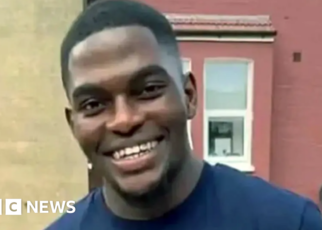[ad_1]
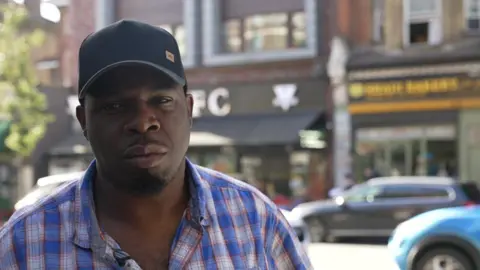 BBC
BBCBlack communities in south London are “really traumatised” and feel they have been “denied justice” after a police officer was cleared of murdering Chris Kaba, community leaders have said.
About 150 people gathered for a vigil outside the Old Bailey in central London on Monday after jurors returned their verdict.
In Croydon on Tuesday, some residents were reluctant to speak to BBC London about the case, but two community leaders sat down to discuss how people were feeling.
Youth worker Anthony King, who runs a crime reduction organisation in Croydon, said: “What hit me the most is the public decision that was done… now there’s a processing that has to take place.”
Martyn Blake, 40, shot Mr Kaba, who was unarmed, during a police vehicle stop in Streatham, south London, in September 2022.
During the trial jurors heard Mr Kaba’s car was boxed in by police cars and he drove backwards and forwards trying to ram his way free.
Mr Blake told the court he believed one of his colleagues was about to die, and so he opened fire to stop the car.
The jury in the murder trial was not told about Mr Kaba’s criminal history but, on Tuesday, Mr Justice Goss lifted restrictions barring the reporting of it.
Mr King said “many people have concerns” and are “really traumatised” not just about the verdict but “what’s happened since in terms of the video that’s been released” – referring to police bodycam footage of the incident issued shortly after the verdict.
“We went two steps forward in terms of building relationships and it just feels like we’ve taken a step back.
“With the police, we’ve seen the impact that it’s had here in Croydon in reducing teenage murders, and we’ve got to do what we can to keep seeing a change in our communities,” he continued.
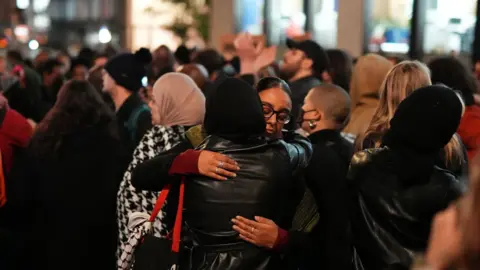 PA Media
PA MediaBeryl St James is a pastor who works with Croydon Voluntary Action (CVA), which interacts with the Met Police to try to reduce violence in the area.
She said people in the community had deeper questions about the justice system and “what threshold was used to decide to charge the officer with murder”.
“People are not looking for, and they don’t want, a guilty verdict per se. They want justice and they want the system to be looked at; at how we got to that position,” she said.
Mr King said he also had questions over the judicial decision-making process, including: “Why did it get to this and how come it dragged on for two years?”
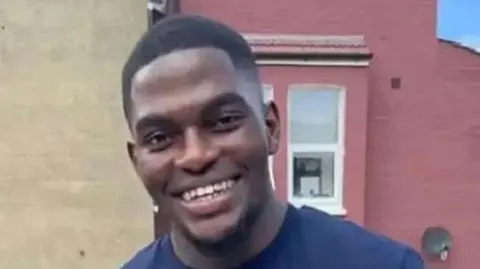 PA Media
PA MediaAfter reporting restrictions on Mr Kaba’s background were lifted, it was revealed he was named as the gunman in a nightclub shooting in Hackney, east London, about a week before he died.
Police officers did not know who was driving the Audi Mr Kaba was in on the night he died, but they did know it had been used as a getaway car in another shooting in Brixton, south London, the day before.
An automatic number plate recognition (ANPR) marker had been placed on the car, which alerted the police to it.
Asked whether news of Mr Kaba’s background might change how the community feels, Mr King said that way of thinking “is not helpful at this moment”.
‘I’m still looking at a life lost’
“Despite his convictions, et cetera, you’ve got a family here who are grieving the loss; a child now has no father,” he said.
“For me, today is about processing the fact that there’s a not guilty verdict, and a family who have loads of questions that need to be answered; today I wouldn’t be focusing on the news of his criminal history.”
Ms St James had a slightly different view.
She said she understood why the judge waited to release the information until after the verdict, because “you don’t want to prejudice the jury”, but “it may have very well changed some people’s opinion (in the community)”.
“Because the previous history said this vehicle was involved in a shooting of days before, that might change some people’s view if they’d have known his history.
“But as Anthony said, the family are still grieving, he’s still their child.”
Mr King continued by saying he would not want people “to just look at his criminal history and think, ‘well, well-deserved'”.
“For me, I’m still looking at a life lost; a life taken. I won’t even say lost – it was robbed, taken. But again, I’ve got mixed emotions.”
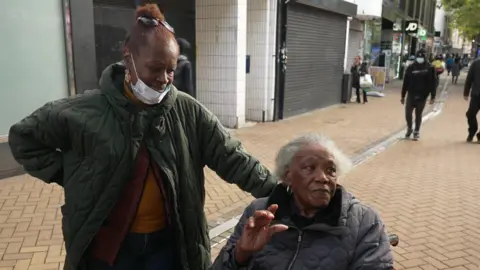
On Croydon High Street, Maureen Patterson, 68, said she was “shocked at the verdict”.
“I hear what the policeman had to say, that he felt that he and his colleagues were in danger, but the thing is he shot him in the head,” she said.
She added Mr Kaba’s history did not make her feel differently, because “at the time the police didn’t know – they were just going after the car”.
“He could have shot the tyres, he could have shot anything else, but he shot to kill.”
Terise Warren, who is 93, agreed that it was a complicated situation but said people “have to look at it both ways”.
‘It’s either me or you’
“A lot of black youngsters have suffered under the hands of the police, and this has gone on for a very long time.
“So there’s a lot of feeling and there’s not a lot of sympathy for this policeman,” she said.
However, she added that the officer was “going to live with this… as long as he lives, even though the court has said he’s not guilty”.
“When sometimes people face fear and panic and when fear and panic takes them, they do all sorts of things,” she added.
“He just shoots… it’s either me or you in a panicked situation. Fear drives people to do a lot of things.
“But at the same time a life has been lost and it’s somebody’s son.”
[ad_2]
Source link
